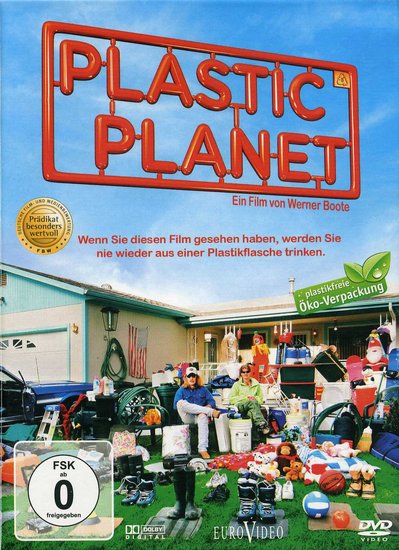Plastic Planet
Controversial and fascinating material that has
found its way into every facet of our daily lives: plastic. He takes us
on a journey around the globe, showing that plastics have become a
threat for both environment and human health. Director Werner Boote takes an up-close
look at the plastics industry in order to explore whether the ubiquitous
man-made material is a danger to human health. The grandson of a
once-prominent plastics magnate, Boote became aware early on that the
material we rely on to make our lives easy could also be poisoning our
planet. Not only because a piece of plastic takes up to 500 years to
deteriorate in the ground or water system, but also because studies
indicate that frequent exposure can also lead to a variety of health
problems in humans. In this film, Boote speaks with scientists,
manufacturers, consumers, and government officials in 14 countries about
the dangers of continued reliance on plastics, as well as alternatives
that could lead to a cleaner world, and a healthier population
ADDICTED TO PLASTIC
This documentary is by "Charlie Williams".
Documentary that explores the history of plastic and how it came to dominate our lives. From styrofoam cups to artificial organs, plastics are perhaps the most ubiquitous and versatile material ever invented. No invention in the past 100 years has had more influence and presence than synthetics. But such progress has had a cost.
For better and for worse, no ecosystem or segment of human activity has escaped the shrink-wrapped grasp of plastic. Addicted To Plastic is a global journey to investigate what we really know about the material of a thousand uses and why there's so darn much of it. On the way we discover a toxic legacy, and the men and women dedicated to cleaning it up.
Addicted To Plastic is a point-of-view style documentary that encompasses three years of filming in 12 countries on 5 continents, including two trips to the middle of the Pacific Ocean where plastic debris accumulates. The film details plastic's path over the last 100 years and provides a wealth of expert interviews on practical and cutting edge solutions to recycling, toxicity and biodegradability. These solutions -- which include plastic made from plants -- will provide viewers with a new perspective about our future with plastic.
Documentary that explores the history of plastic and how it came to dominate our lives. From styrofoam cups to artificial organs, plastics are perhaps the most ubiquitous and versatile material ever invented. No invention in the past 100 years has had more influence and presence than synthetics. But such progress has had a cost.
For better and for worse, no ecosystem or segment of human activity has escaped the shrink-wrapped grasp of plastic. Addicted To Plastic is a global journey to investigate what we really know about the material of a thousand uses and why there's so darn much of it. On the way we discover a toxic legacy, and the men and women dedicated to cleaning it up.
Addicted To Plastic is a point-of-view style documentary that encompasses three years of filming in 12 countries on 5 continents, including two trips to the middle of the Pacific Ocean where plastic debris accumulates. The film details plastic's path over the last 100 years and provides a wealth of expert interviews on practical and cutting edge solutions to recycling, toxicity and biodegradability. These solutions -- which include plastic made from plants -- will provide viewers with a new perspective about our future with plastic.
The MIDWAY media project
The MIDWAY media project is a powerful
visual journey into the heart of an astonishingly symbolic environmental
tragedy. On one of the remotest islands on our planet, tens of
thousands of baby albatrosses lie dead on the ground, their bodies
filled with plastic from the Pacific Garbage Patch. Returning to the
island over several years, our team is witnessing the cycles of life and
death of these birds as a multi-layered metaphor for our times. With
photographer Chris Jordan as our guide, we walk through the fire of
horror and grief, facing the immensity of this tragedy—and our own
complicity—head on. And in this process, we find an unexpected route to a
transformational experience of beauty, acceptance, and understanding.
he film looks at the impact of our almost
complete dependence on plastic bags, which we use and discard
carelessly every day, often to dispose our garbage and kitchen waste.
Not only are these bags a huge environmental threat, they end-up in the
stomachs of cows, who, either because they've been discarded because
they're not milking at the time or because the dairy owner is unwilling
to look after them, have to fend for themselves and forage for food,
which, like other scavengers, they find in community garbage dumps.
Owing to their complex digestive systems, these bags, which they consume
whole for the food they contain, get trapped inside their stomachs
forever and, eventually, lead to painful death. The film is also a
comment on the religious hypocrisy of the cult of the holy cow.



Geen opmerkingen:
Een reactie posten